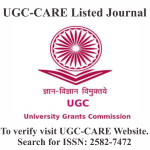THE LINGUISTIC DESCENT OF AMBITION: EXPLORING POWER, CONFLICT, AND DESPAIR IN MARLOWE’S DOCTOR FAUSTUS
DOI:
https://doi.org/10.29121/shodhkosh.v4.i2.2023.3164Keywords:
Doctor Faustus, Linguistic Analysis, Ambition, Internal Conflict, Moral Decline, Christopher MarloweAbstract [English]
This article explores the linguistic and thematic evolution of Christopher Marlowe’s Doctor Faustus, focusing on the interplay of language and character development to illuminate the protagonist’s psychological, moral, and spiritual transformation. By analysing eight key linguistic elements—modal verbs, temporal constructs, rhetorical questions, pronoun shifts, repetition, hyperbole, imperative language, and oppositional constructs—the study reveals how Marlowe captures Faustus’s descent from confident ambition to existential despair. Each linguistic feature is linked to specific acts and scenes, highlighting the gradual progression of Faustus’s internal conflict, moral struggles, and eventual realisation of eternal damnation.
The analysis demonstrates how modal verbs reflect Faustus’s declining agency, while temporal constructs underscore the tension between fleeting pleasures and the permanence of damnation. Rhetorical questions and oppositional language externalise his internal conflict, allowing audiences to engage with his moral dilemmas. Pronoun shifts and hyperbole reflect his psychological fragmentation and emotional extremes, while repetition and imperative language heighten the dramatic intensity of his despair. By interweaving these linguistic elements, Marlowe offers a profound exploration of ambition, accountability, and divine justice.
This study positions Doctor Faustus as a timeless work that transcends its historical context, offering insights into human ambition, moral conflict, and the tragic consequences of overreaching desire.
References
Adams, R. (2015). Exploring consciousness in Renaissance and modern narratives: Doctor Faustus and Inception. Journal of Comparative Literature, 41(2), 245–263.
Bezar, S. A., Azhar, M. A., & Ali, S. (2018). Tenets of structuralism: A structuralist analysis of Marlowe’s Doctor Faustus. Balochistan Review, 1(2018), 75–92.
Blackwell, J. (2021). Ambition and the self: A study of Marlowe’s Doctor Faustus. Journal of Renaissance Studies, 52(3), 284–302.
Brewer, A. (2018). The sacrificed soul: Christian motifs in Doctor Faustus. Renaissance Quarterly, 35(2), 183–196.
Burns, L. (2023). Faustus and the divided self: Consciousness in conflict and parallels with Paradise Lost. Journal of Early Modern Psychology, 17(4), 412–429.
Carter, M. (2022). Pride and peril: A psychological reading of Doctor Faustus and classical tragedy. The Review of English Literature, 45(1), 89–107.
Cooper, K. (2023). The modernisation of the medieval staging of soul in Marlowe’s Doctor Faustus. Early Modern Literary Studies, 18(1), 157–173.
Johnson, H. (2017). Consciousness in Marlowe’s Doctor Faustus: The struggle within. English Literary Studies, 29(1), 56–72.
Marlowe, C. (2005). Doctor Faustus. Oxford University Press. DOI: https://doi.org/10.4324/9780203977965
Murray, D. (2019). Faustus and fate: Morality in the age of the Renaissance and The Divine Comedy. Studies in Renaissance Literature, 28(3), 240–260.
Wright, C. (2020). The damnation of knowledge: Marlowe’s warning in Doctor Faustus. English Renaissance Journal, 44(2), 150–167.
Downloads
Published
How to Cite
Issue
Section
License
Copyright (c) 2023 Kota Sai Krishna, Dr P. Asha Madhavi, H. Seshagiri

This work is licensed under a Creative Commons Attribution 4.0 International License.
With the licence CC-BY, authors retain the copyright, allowing anyone to download, reuse, re-print, modify, distribute, and/or copy their contribution. The work must be properly attributed to its author.
It is not necessary to ask for further permission from the author or journal board.
This journal provides immediate open access to its content on the principle that making research freely available to the public supports a greater global exchange of knowledge.




















